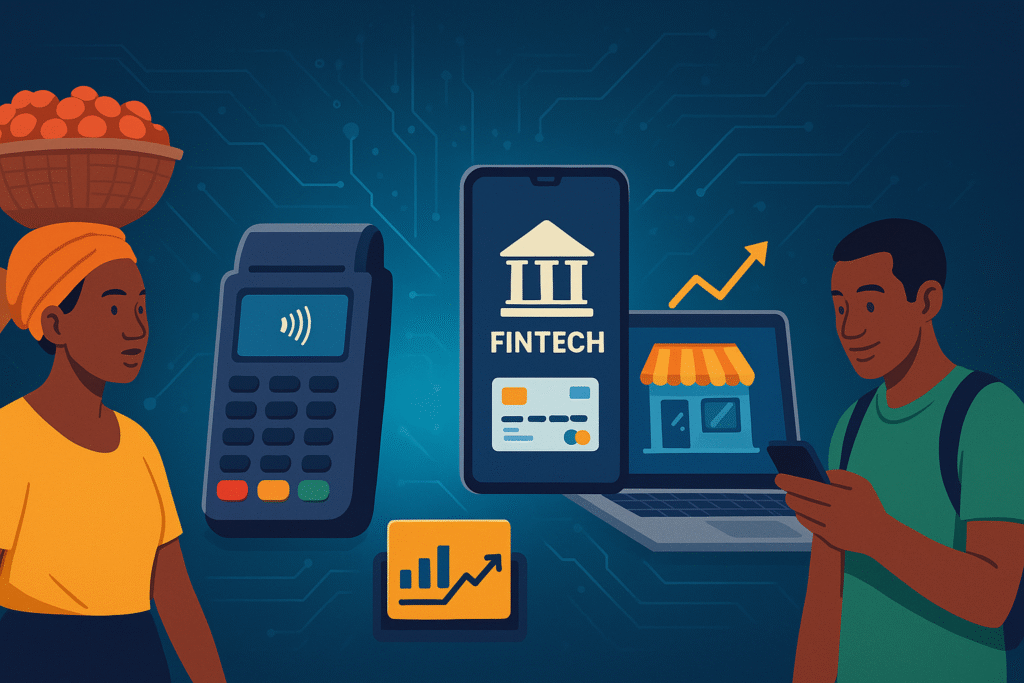Nigeria’s informal economy accounts for more than half of its GDP and employs over 80% of its labor force.
Yet for decades, the vast majority of this population has been excluded from formal financial services. But that’s changing—thanks to fintech.
With mobile technology, agent networks, and digital platforms, fintech solutions are bridging the financial gap for traders, artisans, small business owners, and gig workers across the country.
Here’s how fintech is reshaping Nigeria’s informal economy.
1. Nigeria’s Informal Economy: Big, Busy, But Mostly Unbanked
The informal sector is the heartbeat of Nigeria’s economy—from roadside vendors in Lagos to okada riders in Abuja.
However, limited access to banking infrastructure, low literacy levels, and inconsistent income have kept many Nigerians financially excluded.
This exclusion makes it hard to save, borrow, or plan for the future.
Fintech startups are now stepping in to change that narrative.
2. Agent Banking: Bringing Banks to the Streets
Fintech firms like Moniepoint, OPay, and Quickteller Paypoint have built massive agent networks that bring financial services directly to people in their neighborhoods.
These agents serve as human ATMs—helping customers send money, pay bills, deposit or withdraw cash, and even open accounts.
Moniepoint alone processes over 800 million transactions monthly, valued at more than $17 billion, showing just how deeply fintech has penetrated informal communities.
In 2024, the company reached unicorn status, with investors like Google backing its mission to bank the unbanked.
3. Digital Savings and Investments: Modernizing “Ajo”
Traditional group savings systems like ajo or esusu are getting a digital upgrade. Platforms like PiggyVest, CowryWise, and Bankly make it easy for users to save consistently, earn interest, and even invest—right from their phones.
These apps are especially useful for market women, transport workers, and small business owners who want more control over their finances.
In many cases, they also offer withdrawal restrictions and saving targets, helping users develop financial discipline.
4. Micro-Pensions and Insurance: Preparing for the Future
Fintech is also helping informal workers plan for retirement. Awabah, for instance, provides micro-pension services tailored to Nigeria’s informal sector.
With as little as ₦1,500 monthly, users can save for old age and get access to insurance packages.
To reduce onboarding friction, Awabah goes directly to markets and even helps users register for their National Identification Numbers (NIN)—a key requirement for accessing pension services.
These services are not just financial—they’re educational, promoting long-term financial planning among people often left out of the pension conversation.
5. Business Tools for Informal SMEs
Many informal businesses don’t keep proper records or manage cash flow well.
That’s where tools like Kippa come in. Kippa is an app that helps small merchants record transactions, track debts, and manage inventory.
It also enables business registration, helping informal businesses transition into the formal economy.
Recently, Kippa secured a Super-Agent license, allowing it to expand into providing direct banking services—such as accepting deposits and facilitating transfers—through its merchants.
6. Mobile Banks: Banking Without Branches
Digital banks like Kuda and VBank are reimagining banking for Nigeria’s smartphone generation.
With zero-fee accounts, easy transfers, and budget-tracking features, these apps are increasingly popular among gig workers and informal traders who need flexibility and accessibility.
By eliminating the need for physical branches, digital banks are drastically cutting costs—and passing those savings on to customers who might not otherwise have access to a bank.
7. The Role of Regulation and Infrastructure
The Central Bank of Nigeria (CBN) has taken several steps to support fintech inclusion:
-
Payment Service Bank (PSB) licenses allow telecoms and fintechs to offer low-cost banking.
-
The Shared Agent Network Expansion Facility (SANEF) has helped deploy over 1.3 million agents nationwide.
-
Nigeria’s AfriGo Pay card scheme encourages homegrown, affordable payment systems tailored for local use.
This regulatory support has made Nigeria a fintech leader in Africa, but challenges like low digital literacy and patchy infrastructure in rural areas still exist.
Conclusion
Nigeria’s fintech revolution is making financial inclusion a reality for millions in the informal economy. From saving and pensions to payments and loans, these digital tools are helping Nigerians build wealth, manage money better, and unlock new opportunities.
As more informal workers go digital, the line between formal and informal will continue to blur—empowering individuals and strengthening the entire economy. For Nigeria, this isn’t just about tech—it’s about transformation.


